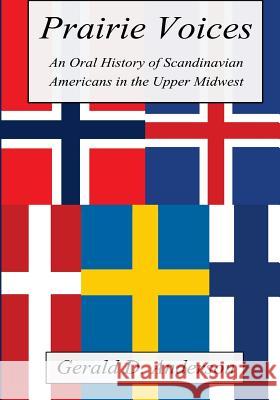Prairie Voices: An Oral History of Scandinavian Americans in the Upper Midwest » książka
Prairie Voices: An Oral History of Scandinavian Americans in the Upper Midwest
ISBN-13: 9781503354586 / Angielski / Miękka / 2014 / 476 str.
Prairie Voices: An Oral History of Scandinavian Americans in the Upper Midwest
ISBN-13: 9781503354586 / Angielski / Miękka / 2014 / 476 str.
(netto: 104,61 VAT: 5%)
Najniższa cena z 30 dni: 102,71 zł
ok. 13-18 dni roboczych
Dostawa przed świętami

Darmowa dostawa!
In 1976, the Northwest Minnesota Regional History Center, a part of the Minnesota Historical Society, conducted a bi-centennial project to record the voices of first and second generation Scandinavian Immigrants in the Upper Midwest, especially in the Red River Valley of Minnesota and North Dakota. The author traveled to their homes and interviewed more than a hundred immigrants or their children to gather information on the immigrant experience. Among the issues explored with these people were conditions in the home country, reasons for emigration, the route of the emigrations and the voyage to America, initial impressions, and the first year in America. The statistical information on this immigration experience, especially for the Norwegians and the Swedes, is quite excellent, but the oral history project was also attempting to capture the intense feelings of the "divided heart" and the psychological crisis of leaving family and friends behind. The interviews also attempted to gather information as to the acculturation of the immigrants. Which new aspects of America did they accept and which did they reject? Finally, the project attempted to measure the retention of Scandinavian traditions and attitudes as they existed at the time of the Bi-centennial. The Swedes, the Norwegians, the Danes, the Icelanders, and the Finns told of their retention of customs, of their church, of their educational experiences, of their language, of their literature, of their music, and, of course, of their cuisine. This book is arranged with separate chapters to examine these issues, mostly using the verbatim transcripts of the interviews. An old Icelandic woman describes traveling by covered wagon to the plains of North Dakota. An old Norwegian man describes patrolling the Swedish border when war threatened in 1905. An old Swedish woman describes homesteading on the prairie. These are wonderful and poignant words, but a transcript can never capture the musical brogue describing the longing for Norway nor can they portray the tear that rolls down a face as a man describes that last Christmas in Sweden. The author is a retired professor of history who taught at Luther College, North Dakota State University, and Minnesota State University Moorhead.











